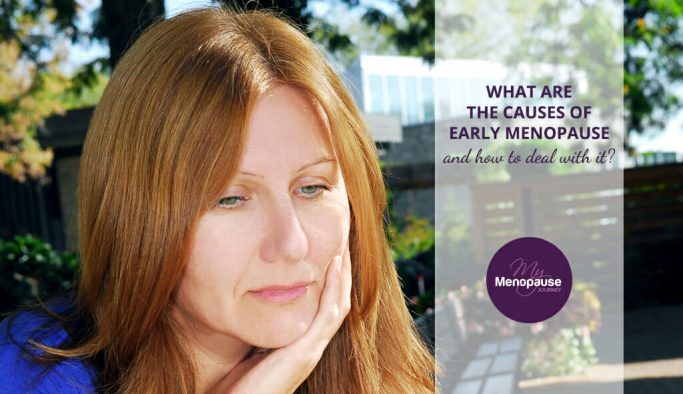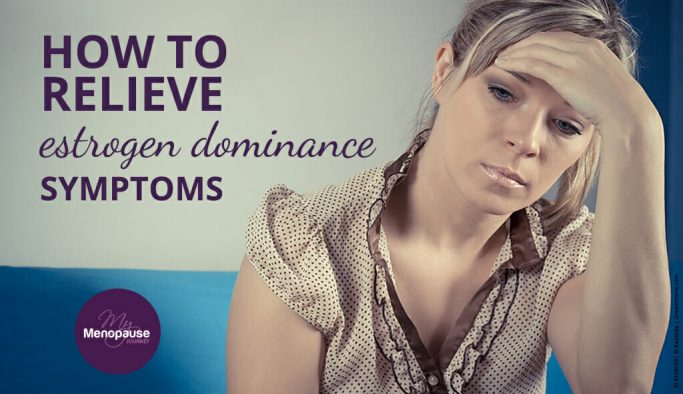Menopause is a milestone that all women face, but I often wonder why so little is understood about this change. First, many of us don’t know that there are three stages of menopause.
Drawing from my own experience, I felt the sting of menopause and I didn’t know it was the big “M” at that time. For a couple of years, my mood changed a lot. I’ve had mood changes before, brought about by PMS, but what I experienced at this time was way more intense and I had it longer. I was confused and didn’t know what to do. Worse, I was given conflicting advice (which made me more confused).
As I was doing some readings, I saw that women usually go through a first stage of menopause called perimenopause. The symptoms matched how I felt, and I asked myself, could this be menopause? I was skeptical, after all, I wasn’t old for menopause yet!
So, I started reading about menopause and it was then I realized it was indeed perimenopause that was causing my discomforts. I didn’t have my mom or my grandmother to tell me about it, because they had longed passed away. No one told me about it. I thought it was just me “not being stable”.
For a lot of us, we understand menopause as menopause. But do you know that there are three stages of menopause? And each stage even has its own set of symptoms!
It’s important to know the three stages of menopause so that you can recognize the symptoms early on and know where you are at. Unlike me, you don’t have to look back years later, recount all your discomforts and regret you didn’t know what was happening.
So, let’s get it on and understand the three stages of menopause, their symptoms and what you can do about your discomforts!


The Three Stages of Menopause and Know What Menopause Stage You’re In!
Menopause isn’t a one-time big-time kind of thing and it sure doesn’t happen in an instant! This life change happens gradually, and you don’t know when it’s coming.
According to the Cleveland Clinic, there are three stages of menopause: perimenopause, menopause and postmenopause. At every stage, hormone levels change and shift, and a wide range of symptoms pop up. Let’s understand the different stages of menopause one by one, starting off with perimenopause.
Perimenopause
When you’re in your 30s or 40s, menopause seems like a far-off thing. But do you know that perimenopause starts at this age? You read that right!
Perimenopause is the first stage of menopause, and it begins 8 to 10 years before your menstruation ceases (when the menopause stage begins). Perimenopause is one of the most difficult stages, because your hormones are unpredictable and erratic. So, what happens to your hormone levels at this stage?
Contrary to what most of us believe, estrogen isn’t the first hormone to fluctuate in perimenopause – it’s progesterone. Although our estrogen levels decline as well, progesterone drops faster than estrogen. This leaves our estrogen levels relatively high compared to progesterone.
In addition, you are exposed to environmental toxins and fake hormones, which can be absorbed in your body. Inside, they blend with your endogenous estrogens and mimic their effects. They will disturb your menstrual cycle and ovulation. These hormone mimickers also elevate your estrogen levels, worsening the imbalance between your estrogen and progesterone.
When estrogen levels become slightly dominant, it results into a condition called estrogen dominance (ED). With little progesterone (relaxing hormone), your estrogen (excitatory hormone) will hyperactivate many body processes, which is the cause of many of your symptoms. Here are some telltale signs that you’re in perimenopause!
- Irregular Periods. This is probably the first symptom that you’ll notice. As your estrogen and progesterone levels go up and down, you may experience hits and misses in your periods.
- Changes in menstrual flow. Aside from inconsistent menstrual periods, your periods may also be heavy or light at times.
- Changes in length of menstrual cycle. Menstrual cycles can be longer or shorter.
- Hot flashes. Changing estrogen levels fool your hypothalamus (temperature-regulating center) into believing your body is heating up. You will feel intense heat on your face, neck and chest. As a result, your hypothalamus attempts to cool off your body from the heat, causing severe perspiration and skin redness.
- Night sweats. Night sweats are hot flashes that occur at night. Like hot flashes, your body cools down and you sweat a lot. Aside from the discomfort, night sweats may disturb your sleep and cause fatigue during the day.
- Trouble Sleeping. Estrogen and progesterone are sleep-promoting hormones. When these hormones shift, getting enough sleep can be difficult. Low estrogen may also suppress the production of the sleep hormone, melatonin.
- Vaginal Dryness. Estrogen, progesterone and testosterone keep your vaginal tissues soft and supple. They also stimulate vaginal lubrication and promote arousal when you have sex. When these hormones start declining, lubrication becomes difficult and your vaginal tissues will lose their elasticity. Many women also have problems with Vaginal atrophy. It is when the vaginal walls get thinner, dryer and inflamed due to less estrogen.
- Headaches and migraines. Although there are many reasons (sleep disturbances and anxiety) why you have recurring headaches and migraines, one of the main reasons is because of low hormone levels. Estrogen opens your blood vessels and promotes better blood circulation, while progesterone tightens them. When both these hormones fluctuate, your blood vessels will get confused and they’ll expand and contract continuously, causing pressure changes in your head, leading to headaches and migraines.
- Mood changes. Estrogen and progesterone are naturally calming and relaxing hormones in your body. Low levels of these hormones also lower the production of your mood hormones, serotonin and dopamine. All these, together with stress can cause anxiety, mood swings, irritability, crying spells and depression.
Personally, I didn’t have the typical symptoms like hot flashes and night sweats. Mine was more of mood changes and anxiety. You see, menopause symptoms are not the same for all women. There are also a few who don’t get these symptoms. Lucky them! ?
A friendly reminder, even if you’re already going through perimenopause, there’s still a chance that you can get pregnant.
Perimenopause vs. Premenstrual Syndrome and Thyroid Problems
Perimenopause symptoms can be quite difficult to distinguish. They are sometimes mistaken for the symptoms of Premenstrual Syndrome (PMS) or thyroid problems. But you can set perimenopause apart by noting the frequency and severity of your symptoms.
Perimenopause has two very classic signs: irregular periods and hot flashes/night sweats, which can be really persistent. PMS symptoms usually occur two weeks before your period and goes away after that. The symptoms can be quite severe, hindering activities of daily living.
Perimenopause symptoms can also be very similar to the symptoms of hypothyroidism. Unlike PMS, it is difficult to identify hypothyroidism based on mere symptoms. Perimenopause and hypothyroidism symptoms overlap to a great extent.
To be sure, you may need to take some menopause tests to check for hormones and some thyroid test.
Watch this video by Dr. Anna Garrett as she explains why irregular periods happen first during perimenopause [3:54]:
Menopause
If you haven’t had your periods for a full 12 months, you have now entered the menopause stage. Women’s Health says the average age that a woman reaches this stage is at 51.
In this phase, your ovaries start to falter and producing eggs become intermittent. As a result, ovulation diminishes. This also affects your estrogen and progesterone levels, because their production depends on ovulation. At this time, your body will mainly depend on the scant amounts of hormones produced by your adrenal glands and your fatty tissue.
Perimenopause symptoms will still be present and with the addition of other symptoms like:
- Frequent Urination/Urinary Incontinence. During menopause your vagina and urethra lose elasticity and wall linings become thin; pelvic muscles may also weaken. It is normal for menopausal women to lose control of their bladder, resulting to frequent urination or urinary incontinence.
- Urinary Tract Infections. Vaginal dryness and changes in the urinary tract make you susceptible to infection.
- Loss of Libido. Low sex drive during menopause is associated with low progesterone and testosterone levels. It can also be caused by other menopause symptoms like vaginal dryness, pain in the reproductive area and depression.
- You will feel tired, weak and drowsy at times. Estrogen plays a big role in energy regulation at a cellular level, so this explains why you will feel exhausted.
- Thinning of the hair. Losing hair can start during the perimenopause stage and can last until the menopause stage. Estrogen and progesterone are essential for collagen and keratin production, these are proteins that are important for hair, skin and nail growth.
- Brain fog. Mental blocks, memory lapses and poor concentration are caused by estrogen deficiency. Estrogen receptors are all over your brain, especially the hippocampus which is in charge of focus and memory. With low levels of estrogen, this part of the brain cannot function properly.
- Weight Gain. Your fats are essential in producing estrogen. So when your body detects that you have low levels of the hormone, it will retain more fat cells. In addition, progesterone and testosterone decrease at this stage, and these hormones are vital to your metabolism.


The illustration shows the levels of estrogen and progesterone as a woman ages. Notice that as age increases, the secretion of both hormones begins to decline. However, as you can see, progesterone is decreasing quicker compared to estrogen. This is what happens in ED. As a woman reaches 70 years old, estrogen and progesterone are at their lowest levels.
If you want to gain a deeper understanding of menopausal symptoms, visit our Symptoms Page. Here you will find many possible symptoms you can experience during menopause as well as tips and remedies to overcome them.
Postmenopause
Postmenopause isn’t really a stage. A “stage” passes and transitions, but postmenopause is a lifelong journey. It is permanent, and you will stay in it for the rest of your life.
The average age where you’ll enter postmenopause is 55. Throughout your life, your hormones remain at very low levels. It marks the permanent end of your menstruation and menopause symptoms start to cease.
However, it’s still important to take care of your health, because with the cessation of hormone production comes a number of risks, which include the following:
1. Osteoporosis
Estrogen is essential in preserving bone mass. With its depletion your bones become denser, they easily brittle and the risk of fractures increases. Going through menopause, you will lose 25% of your bone mass, putting you at risk for osteoporosis.
2. Heart Problems
The National Institute on Aging (NIH) included cardiovascular disease as one of the major health concerns of postmenopausal women. Although men are more prone to heart disease, women are equally at risk when they reach the age of 60.
Estrogen plays a central role in blood vessels and heart health. The hormone also helps control bad cholesterol (LDL) and triglyceride levels, preventing high blood pressure. But with low levels of the hormone, your bad cholesterol rises, blocking arteries and circulatory problems, which can lead to strokes or heart attacks.
Menopause is something that you can manage and overcome. The video below explains the stages of menopause and how you can deal with your symptoms. You can also check out Menopause Taylor’s other helpful videos!
5 Simple Ways to Reduce Menopause Symptoms and Stay Healthy in the Different Stages of Menopause!
Lifestyle is a major factor that you should focus on throughout your life. Eat healthy, enjoy routine exercises and de-stress from time to time! Here are other tips that you can incorporate in your life.
- Let food be your medicine. Fresh and organic fruits and vegetables and high-fiber food sources are helpful in keeping you healthy. They give you the energy to perform activities and keep you away from diseases. Have more superfoods, grass-fed and home-grown chicken and meat. Support your heart by having more omega-3 rich foods.
- Exercise should be on top of your list! 10 to 30 minutes of aerobic exercise and burst training can make a huge difference. Exercise triggers the production of serotonin, which improves your mood and sleep. Exercise also prevents weight gain and strengthens your bones. We present handpicked free exercise channels on our site for you to choose from! Remember, if you’re stressed and overwhelmed, relaxing walks, yoga and Pilates are best! Rigorous exercises can do more harm than good, because they place more stress on the body.
- Try adaptogenic and phytoestrogenic herbs. They have natural hormones and hormone balancing properties that can help. Ashwagandha, ginseng, wild yams, sarsaparilla, Maca and Shatavari are some of the best herbs you can use.
- Dietary supplements and menopause supplements are also great options to replenish vitamin deficiencies and manage menopausal symptoms. Vitamins C, B and E have antioxidant and anti-inflammatory properties, which can help with hormone balance. Calcium, magnesium and selenium are minerals that stimulate the production of estrogen, progesterone and testosterone. If you want to know more about the different supplements for better health, we have a supplements summary that you can check out.
- Reduce stress in your life. Learn to slow down, delegate and let go of things that are stressing you out. Stress alone can mess up your hormones with the release of the stress hormone, cortisol.
Take a Menopause Test to Check your Hormone Levels!
To be certain you’ve entered the different stages of menopause, we prepared a comprehensive list of menopause tests for you! You can do the testing yourself with the use of self-test kits. There are also quizzes that you can take to know if you have hormonal imbalance. The hormone balance test made by Dr. John R. Lee, Dr. David Zava and Virginia Hopkins is just an example.
Every woman has a different menopausal experience. Don’t feel embarrassed by your condition, because menopause is not a disease!
It is a life passage that happens to every woman. As a matter of fact, many women are now reporting menopause as a positive experience. It has strengthened family and relationship bonds.
Among the three stages of menopause, which stage do you think you’re in?
References:
womenshealth.gov/menopause/menopause-basics/
nytimes.com/section/well
obgyn.coloradowomenshealth.com/health-info/menopause
my.clevelandclinic.org/health/diseases/15224-menopause-perimenopause-and-postmenopause
nia.nih.gov/health/what-menopause
👉 What to Do Next
Don’t go just yet — especially if you’ve been feeling off and no one’s given you real answers.
Go to the START HERE page.
It’s where things begin to feel clearer. No more second-guessing, no more sorting through conflicting advice. Just calm, honest support for where you are right now.
And if you haven’t yet, download the FREE GUIDE.
It’s quick, clear, and made to help you feel better — without having to turn your whole life upside down.


Gita is the founder of My Menopause Journey. Since 2014, she has been supporting midlife women by sharing hard-earned learnings from her own experience. To advance her knowledge, Gita puts a lot of her time and effort into understanding the broad spectrum of women’s health. She immerses in extensive research about the physical, mental and emotional aspects of menopause. Gita believes in the life-changing power of healthy, holistic living — this is where she anchors her message to all women. Learn more about her marvelous mission in About us - My Menopause Journey.







I have just started taking Shatavari capsules 1 x 730mg per day as per my Gynaecologist’s recommendation. Any ideas how long before any benefit is felt?
Hi Val,
Some herbs have immediate effect and others take a bit longer.
I recommend you ask instructions from where you bought it or from a herbalist nearby.
All the best,
Gita
This has helped me immensely and looking back can see my peri menopause symptoms better. I wish more employers would be more sympathetic and understanding what women go through at this stage of their lives. Also more awareness out there is needed even for teenage children so that they can understand what their mother or grandmother is going through. I wish when I was younger more awareness was given to me so that I could have understood what my mother was going through at a time we couldn’t understand her behaviour. Not enough awareness out there. In the U.K. You get some but in the Indian sub continent where parents don’t even talk to their daughters about Periods these is even less awareness of the menopause.
Hi Abeda,
Totally agree with you.
I also wish I had known what I know now in perimenopause.
That way I could have done something about it and most of all, I could better have understood all emotions and anxiety. That would have made that period much easier.
This is a subject that is not discussed very much in any part of the world. Let’s change that. Spread the word so we can help each other.